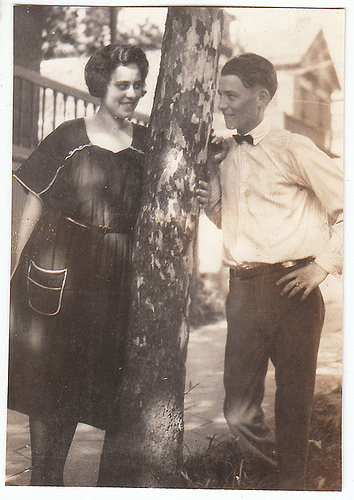Posted out of sequence
Over the next six years, Neeley gave birth to three more children. She was an indulgent mother to them and to Clara Bea. For the rest of her life she said, “When your children are little they step on your toes. When they get older, they step on your heart.” After three consecutive drought years with no cash crop, Eddie was way behind on his banknote and at the grocery store. When he couldn’t even pay the interest on his loan, the bank refused him further credit. The grocer had to cut him off, too. Sadly, he lost the farm and had to become a sharecropper, a situation few could escape. It was like falling into a vortex. The only advantage of share-cropping was that the owner furnished seed, land, and lodging, a deal with the devil since the landowner charged seed and supplies against the sharecropper’s pay at the end of the season. Even worse, some landowners paid in script which could only be used in trade at their own store. Sharecroppers were unlikely to be privy to the crop price, so were easily cheated. They just got deeper and more hopelessly in debt to the landowner every year, essentially becoming enslaved. Should they try to abscond on the debt, they could be charged with theft. Many had to steal away in the night, leaving the majority of their belongings behind.
The typical sharecropper’s cabin was unpainted and often had shutters instead of windows. Likely, wire was nailed over the windows to keep varmints out. A four-room shack with a porch would have been generous. It was very common for shacks to sit in cotton fields with tiny yards and no shade trees. It was common for several to be clustered together around one well. They depended on fireplaces and wood stoves for cooking and heat. Toilets served for sanitation. Both blacks and whites worked as sharecroppers. It was common for children to work alongside their parents at planting and harvest time. “Them that don’t work don’t eat,” was a common saying. Society looked down on sharecroppers, inferring that a man with drive wouldn’t find himself in that position. Prejudice is always with us.
When the sheriff came out with the eviction notice, the banker sent Eddie word that his brother-in-law, Mr. Hathaway, needed a fellow. One of his workers had moved on last week. In desperation, Eddie said he’d take it. Neeley was mad. “We can do better than that. Ever’body knows what a crook he is. Mary Jones said he ain’t paid ’em nothin’ for their crop last fall. That’s why he’s got a spot now. We can find something better.”
Eddie refused ro look further saying, “We got nowhere else to go. I ain’t turning this spot down.”

















